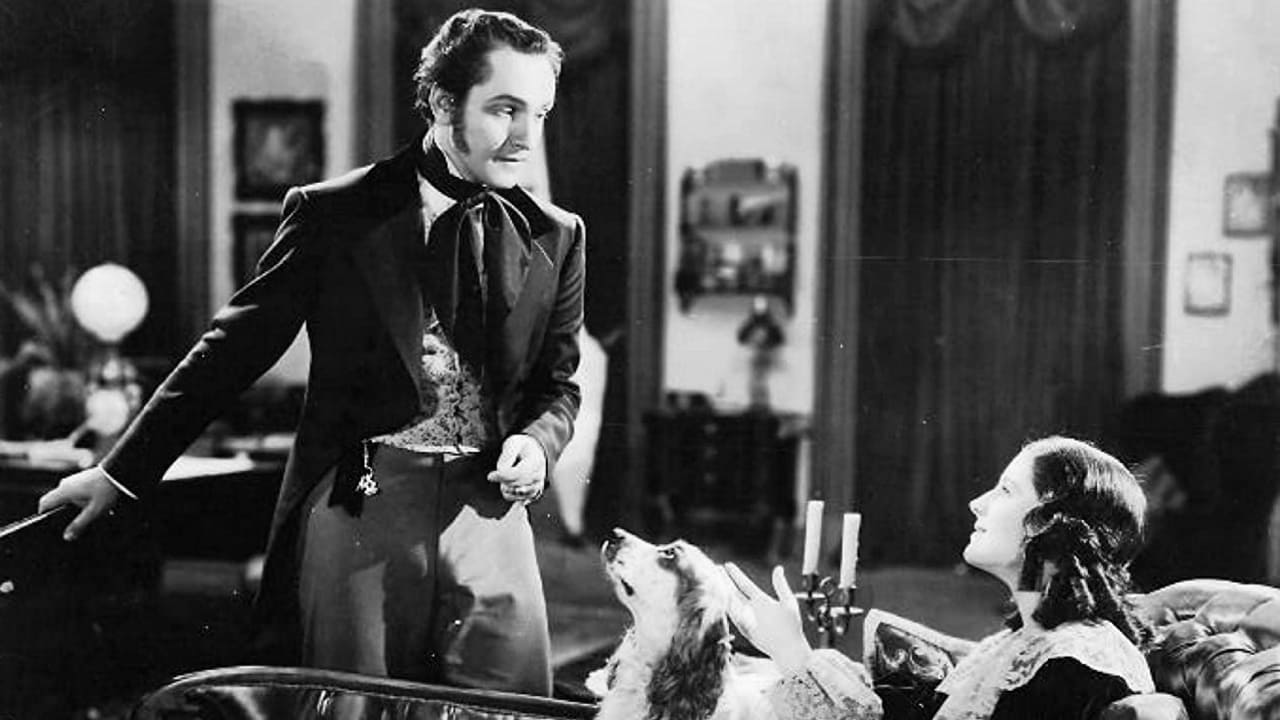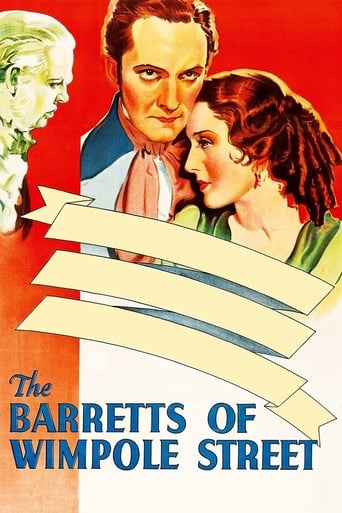

An Exercise In Nonsense
... View MoreAm I Missing Something?
... View MoreIt's funny watching the elements come together in this complicated scam. On one hand, the set-up isn't quite as complex as it seems, but there's an easy sense of fun in every exchange.
... View MoreThe movie's neither hopeful in contrived ways, nor hopeless in different contrived ways. Somehow it manages to be wonderful
... View More"The Baretts of Wimpole Street" released in 1934, has the stamp of MGM's great production values. Norma Schearer wonderfully plays Elizabeth Barrett, the invalid poet. She is overly protected by her father, brilliantly played by Charles Laughton. We later learn Laughton is really a tyrant of a man who is incapable of really loving anyone or being loved. Elizabeth meets the fellow poet Robert Browning (Frederic March), and they fall in love. Maureen O'Sullivan give one of her finest performances as Elizabeth's sister, who also falls in love with a Captain. Her father finds out and forbids her to see him again, in a cruel and heartbreaking scene where he makes her swear on a bible. The interplay between Laughton and O'Sullivan and Schearer is fascinating, as the family dynamics are brought to the foreground. "The Barretts of Wimpole Street" was originally a stage play, but translates just fine to the screen. The supporting case is top notch, but this is Norma Schearer's show. It is difficult to take your eyes off her. Laughton is great, as is O'Sullivan. Frederic March at times seems a bit off as Robert Browning, although he is very handsome and the chemistry between he and Schearer is credible. It is a shame that Norma Schearer left the movies by the 1940's. But we are fortunate that this gifted actress left such an amazing legacy of films - "The Barrets of Wimpole Street" is certainly one of them.
... View MoreThis film is adapted from the 1931 Rudolf Besier Broadway play that starred Katherine Cornell and Brian Aherne in the roles of poets Elizabeth Barrett and Robert Browning. For the MGM film version Norma shearer and Fredrick March take over the roles. No one from the stage version that briefly returned to Broadway in a revival after this film's success, was cast for the film. Charles Laughton plays the tyrannical, repressive, domineering and possessive father of Elizabeth Edward Moulton-Barrett, Maureen O'Sullivan is Elizabeth's sister Henrietta. Una O'Conner provides comic relief as the maid Wilson in a role where she glides into each room feet unseen under her long Victorian skirts which show not a ruffle or indication of movement of legs or feet to stir the skirts material so the film makers must have had her on some type of platform on wheels to achieve the effect. Leo g. Carroll is also among the cast. Flush the dog is here to and it's possible it may have been the same dog used in the Broadway play. Veteran cinematographer William H. Daniels photographed the film. His career would take him into the 1970's and he did several Frank Sinatra films like Von Ryan's Express and Ocean's Eleven in the 1960's. Daniels was also Greta Garbo's cinematographer and he photographed 20 of her films. He also photographed 10 films in the career of Norma Shearer and is with her again here in the Barretts of Wimpole Street, the story of two poets falling in love and their fight to break the chains of her father's suppression and her own invalidism. Norma Shearer is always great to watch on screen. She came out of the silent film era and uses such facial expression and hand movements that were necessary in silents. Many actors couldn't drop their stage theatrics in the transition to talking pictures and they faded from overacting. Shearer keeps her theatrics and pulls it off. She's also one of my favorite screen beauties. Another of my favorites is Maureen O'Sullivan and she is beautiful here and handles her comedic moments with skill. The part where she's secretly meeting her boyfriend across the street from her house and she keeps telling not to look at the house is a riot. Sidney Franklin who had directed Shearer in a couple of her previous films is the film's director. Shearer received her fourth Academy Award nomination for Best Actress for 1934 and the movie was nominated for the Best Picture Oscar in a field that had 11 pictures nominated for Best Picture that year. Claudet Colbert appeared in three of those nominated Best Picture films including It Happened One Night which won Best Picture and gave Colbert Best Actress. The Barrets of Wimpole Street is a little too stagy but it has a lot going for it and I would give it an 8.0 out of 10.
... View MoreTwo famous personalities from Victorian England, and yet Hollywood can't be bothered giving them English accents. Laughton, despite his mutton chop sideburns and glowering demeanor, looks far too young to be Shearer's father (in actual life is only 3 years older than she). Well at least he adds some spirit to this rather stage bound, dull movie.March didn't convince me he could write a line of poetry. The engaged cousin is a female Elmer Fudd, advewse to evew pwonouncing an R. Shearer's illness is not explained, perhaps she recovers from a bad cold, we don't know, in any event she appears remarkably fit at movie's end.Maureen O'Sullivan, and Una O'Connor are good in supporting roles, and the costuming is well done.I'll remember this movie for Laughton's valiant attempt at portraying a middle aged man, all the more ineffective having seen him as a middle aged man in his more recent films.
... View MoreThis was a prestige effort in every way in 1934, gathering together the Academy Award winners of the past three years to appear together in the film version of a highly respected play. That the play no longer holds the stage, and that it is old fashioned melodrama, is hardly the point. The script may lean towards the treacly, but both Charles Laughton and in particular Norma Shearer give it s real lift.Laughton is somewhat hammy, playing Mr. Barrett as a slightly toned down Dr. Moreau. But I defy anyone to look away; and towards the end of the film he does give a fine impression of a man in torment. But it is Shearer who really carries the film; absolutely lovely performance, restrained and wisely underplaying with Laughton. Observe their final confrontation and note how Shearer's performance rises in intensity as Laughton's grows more subdued. This is a high class of ensemble acting.Only Fredric March lets the film down by being far too energetic as Robert Browning; meant to be cockily eccentric, he succeeds in putting your teeth on edge. Still, Norma loves him convincingly enough.A highly recommended film for a rainy afternoon.
... View More